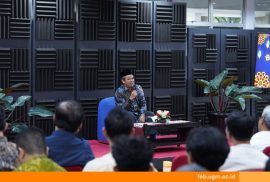Climate change has now become a never ending issue to be discussed. Every day, the earth, which is the home of all living things, experiences a boatload of problems. This is the very reason why the conversation on sustainability is constantly brought up; however, the Covid-19 pandemic turned out to positively affect climate change in a good direction and gave rise to a new trend related to digital transformation. To explore this discussion, the Faculty of Economics and Business (FEB) UGM held a webinar on Wednesday (28/07), themed “Accelerating the Digital Transformation: BPK’s Response to Covid-19 & Digital Economy.”
This webinar is part of the virtual summer program held by FEB UGM.speakers of this webinar was Bahtiar Arif, SE, M.Fin., Ak., CSFA., CPA as General Secretary of BPK RI and Pranoto as Head of Information Technology Bureau of BPK RI and moderated by Shima Dewi Mutiara Trisna, SE, MA., a lecturer at FEB UGM. The trend of the relationship between sustainability and digital transformation that occured as a result of the Covid-19 pandemic was the main discussion in the webinar.
Bahtiar explained that the presence of the Covid-19 pandemic presented a trend related to technology from the 4.0 Industrial Revolution. Cloud computing, cyber security, Internet of Things (IoT), blockchain, big data analytics, RPA, AI, and machine learning. He also explained that the Covid-19 had caused the number of internet users in Indonesia to increase drastically due to the change from direct to virtual activities, such as through video conferencing. In the era of the 4.0 Industrial Revolution following the VUCA (Volatility, Uncertainty, Complexity, Ambiguity) conditions, digital transformation was deeply encouraged and required. In BPK itself, digital transformation is the process of converting the latest information technology and information systems from organizations so that information systems can be connected and provide added value for organizations and workers in general.
Bahtiar stated that, in early 2020, BPK was also affected by Covid-19 and had to change the way of working from what should be a face-to-face meeting to working from home (WFH) by utilizing IT. BPK successfully carried out digital transformation during the pandemic as evidenced by their audit reports that were completed on time. This success can be achieved with the help of IT, namely by utilizing video conferencing, conducting online audit reviews, checking evidence online, and much more.
Meanwhile, Pranoto discussed Big Data Analytics (BDA) in the BPK. He explained that in 2010, BPK had started conducting electronic-based audits (E-Audit). After 10 years, the data was very large in quantity, pushing BPK to conduct Big Data Analytics to make it easier for their organization’s entities to carry out their work. In addition to using BDA, there is also a technique used by auditors to test data that is following audit procedures by using Computer Assisted Audit Techniques (CAATs).
Pranoto explained that to increase the capacity of Big Data Analytics, BPK RI has formed international cooperations with several organizations. Among them are INTOSAI, ASOSAI, and EUROSAI. Pranoto also emphasized that for digital transformations to continue, several things need to be done, such as mindset transformation, technological transformation, cultural transformation, and process transformation.
Reportage: Merisa Anggraini
Video webinar: https://youtu.be/F_3fy2Nvy9k




